|
|
|
Sort Order |
|
|
|
Items / Page
|
|
|
|
|
|
|
| Srl | Item |
| 1 |
ID:
123857
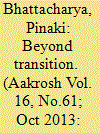

|
|
|
| 2 |
ID:
135582
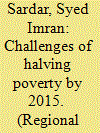

|
|
|
|
|
| Summary/Abstract |
On the onset of twenty-first century, the United Nations millennium summit unanimously adopted a millennium declaration. The declaration set out eight goals in which halving extreme poverty and hunger was prioritized as the goal number one. the remaining seven goals ( education; gender equality and women empowerment; reduction in child mortality; maternal health improvement; combating HIV/AIDS, malaria and other disease; environmental sustainability, and global partnership for development) deal with other dimensions of poverty.
|
|
|
|
|
|
|
|
|
|
|
|
|
|
|
|
| 3 |
ID:
176216
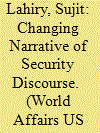

|
|
|
|
|
| Summary/Abstract |
Security discourse has radically changed over the years, especially since the Post–Cold War period. The traditional concept focuses on state security and national security, and is essentially based on realist and neo-realist paradigms. However, in 1994, the United Nations Human Development Report for the first time elaborated the notion of human security and the associated Human Development Index (HDI). Human security advocates a people-centric approach to security. The two foundational principles on which human security is based are “freedom from fear” and “freedom from want.” I evaluate the notions of state security versus human security and examine how South Asian countries have fared regarding the human security indices. I conclude that, despite advances in some areas, various HDI parameters show that the human security record is still rather dismal in South Asia. There remains a critical need to improve it.
|
|
|
|
|
|
|
|
|
|
|
|
|
|
|
|
| 4 |
ID:
155300


|
|
|
|
|
| Summary/Abstract |
This paper develops a panel smooth transition vector autoregressive model to investigate the economic growth–defense causality. This model simultaneously resolves the estimation problems of endogeneity, heterogeneity, and nonlinearity. Empirical results support that the causality is bidirectional, nonlinear, time- and country-varying. Economic growth has a negative impact on military spending and vice versa. The larger the HDI, the smaller the negative causality. Evidently, the increase in the level of country development can reduce the negative impact of military outlays on economic growth. Reducing the ratio of military spending to GDP is beneficial for countries with low HDI scores; however, moderately increasing the share of military expenditure is favorable for countries with extremely high HDI scores. Policy authority needs to set optimal education, health, and economic development shares of GDP for purchasing a maximum economic growth rate.
|
|
|
|
|
|
|
|
|
|
|
|
|
|
|
|
| 5 |
ID:
107450
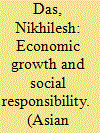

|
|
|
| 6 |
ID:
137345
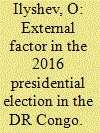

|
|
|
|
|
| Summary/Abstract |
APRIL 2014 marked twenty years since the beginning of the genocide of the Tutsi of Rwanda; organized by the Hutu and practically ignored by the key international actors and the UN it went on for three months to shape the future of Rwanda* and echoed across the vast Great Lakes region, first and foremost in the Republic of Zaire (the Democratic Republic of the Congo, DRC, since May 1997). Hundreds of thousands of refugees, both Tutsi and Hutu,** created a big seat of tension in the country's east; in 1997, the Mobutu regime fell victim to this tension fanned by inner ethnic and political contradictions which in 1996 had developed into an armed conflict still going on in the east of the DR Congo.
|
|
|
|
|
|
|
|
|
|
|
|
|
|
|
|
| 7 |
ID:
129750


|
|
|
| 8 |
ID:
118103


|
|
|
| 9 |
ID:
120901


|
|
|
|
|
| Publication |
2013.
|
| Summary/Abstract |
The authors propose a classification of the perceived corruption levels of Mediterranean countries according to key political, economic, and social factors. While relevant empirical research has shown the extent of corruption in various countries by analyzing differences in their respective values on a corruption perceptions index, the variables used here include additional data such as gross national income per person in purchasing power parities, a political rights index, a civil liberties index, and a nonincome human development index. Although northern Mediterranean countries are distinguished from Arab and Balkan countries, the labels developed and developing countries in the Mediterranean seem too simplistic when describing the marked heterogeneity within these two groups. The lack of homogeneity can be attributed to institutional and cultural country- specific factors rather than to crude differences in levels of economic development. This suggests that policies against corruption should target a complex ensemble of driving factors not limited to the economic characteristics of an individual country and should include social political, cultural, institutional, and territorial considerations.
|
|
|
|
|
|
|
|
|
|
|
|
|
|
|
|
| 10 |
ID:
165523
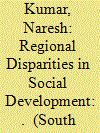

|
|
|
|
|
| Summary/Abstract |
The present study examines the regional disparities in social development in India by using social development index (SDI). The study used census-based data of 2011 including 28 states and seven union territories (UTs) of India. The study ends by ranking of states and UTs on the basis of development index consisting of 12 social indicators. This article also compares selected states on the basis of human development index (1981, 1991 and 2001) and SDI (2011) values. In addition, the study finds district-level SDI and ranks the districts of selected states, that is, Kerala, Haryana and Bihar. The findings of the study confirmed the northern–southern social development divide in India. The empirical findings show that Kerala is the best state among all states in India in terms of social progress. Results of the study confirmed huge disparities at district and states/UTs level in India.
|
|
|
|
|
|
|
|
|
|
|
|
|
|
|
|
| 11 |
ID:
105395


|
|
|
|
|
| Publication |
2011.
|
| Summary/Abstract |
This article investigates the relation between socioeconomic development and democratization in contemporary Turkey with reference to modernization theory. Based on studies showing that there is a positive correlation between socioeconomic modernization and democratization, it is argued that the relatively increased level of socioeconomic modernization in contemporary Turkey has created a more conducive environment for further democratization and democratic consolidation. In this regard, Turkey's GDP per capita, income distribution (Gini coefficient), level of industrialization and urbanization, educational attainment, and human development index (HDI) are analyzed in terms of their influence on democratization. Taking into account Turkey's increased level of socioeconomic development, EU-based reforms, and recent Freedom House ratings, it is argued that Turkey could be getting closer to democratic consolidation.
|
|
|
|
|
|
|
|
|
|
|
|
|
|
|
|
| 12 |
ID:
118612
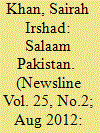

|
|
|
| 13 |
ID:
177771


|
|
|
|
|
| Summary/Abstract |
The present study explores the socio-economic scenario of the South Asian region before and after the outbreak of the COVID-19 pandemic. It analyses the long run and short-run association between human development, unemployment and the economic growth of the region using the Pooled Mean Group (PMG) Autoregressive Distributed Lag (ARDL) model before the situation of the pandemic. It was found that human development has both short-run and long-run association, while the unemployment level has only a long run association with economic growth of the South Asian region. The study suggests that maintaining quality and growth sustainability during and after the pandemic situation will ultimately depend on the human development aspects of the region in terms of appropriate fiscal and monetary policy, vocational training, increased dependence on domestic production and consumption.
|
|
|
|
|
|
|
|
|
|
|
|
|
|
|
|
| 14 |
ID:
119763
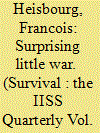

|
|
|
|
|
| Publication |
2013.
|
| Summary/Abstract |
The war in Mali broke out on 11 January 2013 in the form of an out-of-theblue French offensive against two armed columns heading towards Bamako, the country's capital. During the following weeks, a brigade-sized French force, accompanied by a similar number of soldiers from West African countries, reclaimed an area the size of Texas from jihadist groups, which in spring 2012 proclaimed to have set up an independent territory called Azawad in the northern 60% of Mali.1 Although the war in Mali was not a blitzkrieg, as claimed by some, in some ways it can be considered a harbinger of postmodern conflict.2 The war may yet slide into a strategic dead end reminiscent of Iraq and Afghanistan, but such a fate is not preordained.
|
|
|
|
|
|
|
|
|
|
|
|
|
|
|
|
| 15 |
ID:
129012


|
|
|
| 16 |
ID:
104271


|
|
|
|
|
| Publication |
2011.
|
| Summary/Abstract |
POVERTY as a complicated economic and social phenomenon with a frequently decisive political impact has traveled a long road to arrive at the top of international agenda. The international community recognized it as a worldwide phenomenon inherited from the distant past and the tribal system which has survived millennia to become the only mode of life for the majority of those living on Earth on the brink of physiological survival. Poverty is a sign of inadequate economic development and an unfair distribution of the national income.
|
|
|
|
|
|
|
|
|
|
|
|
|
|
|
|
|
|
|
|
|